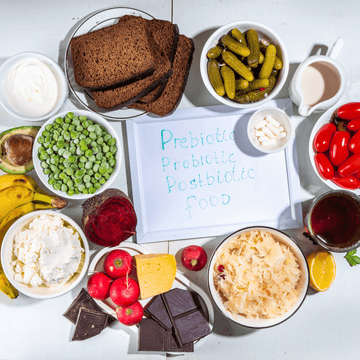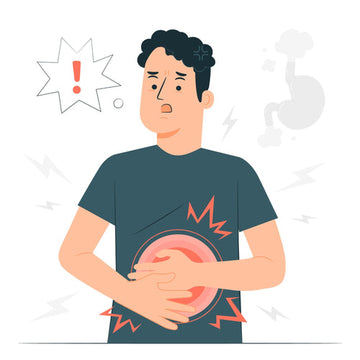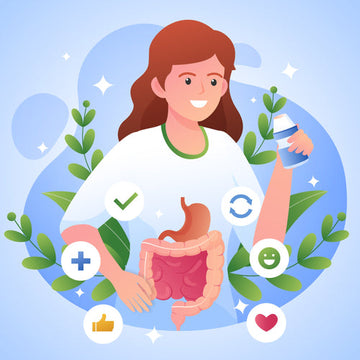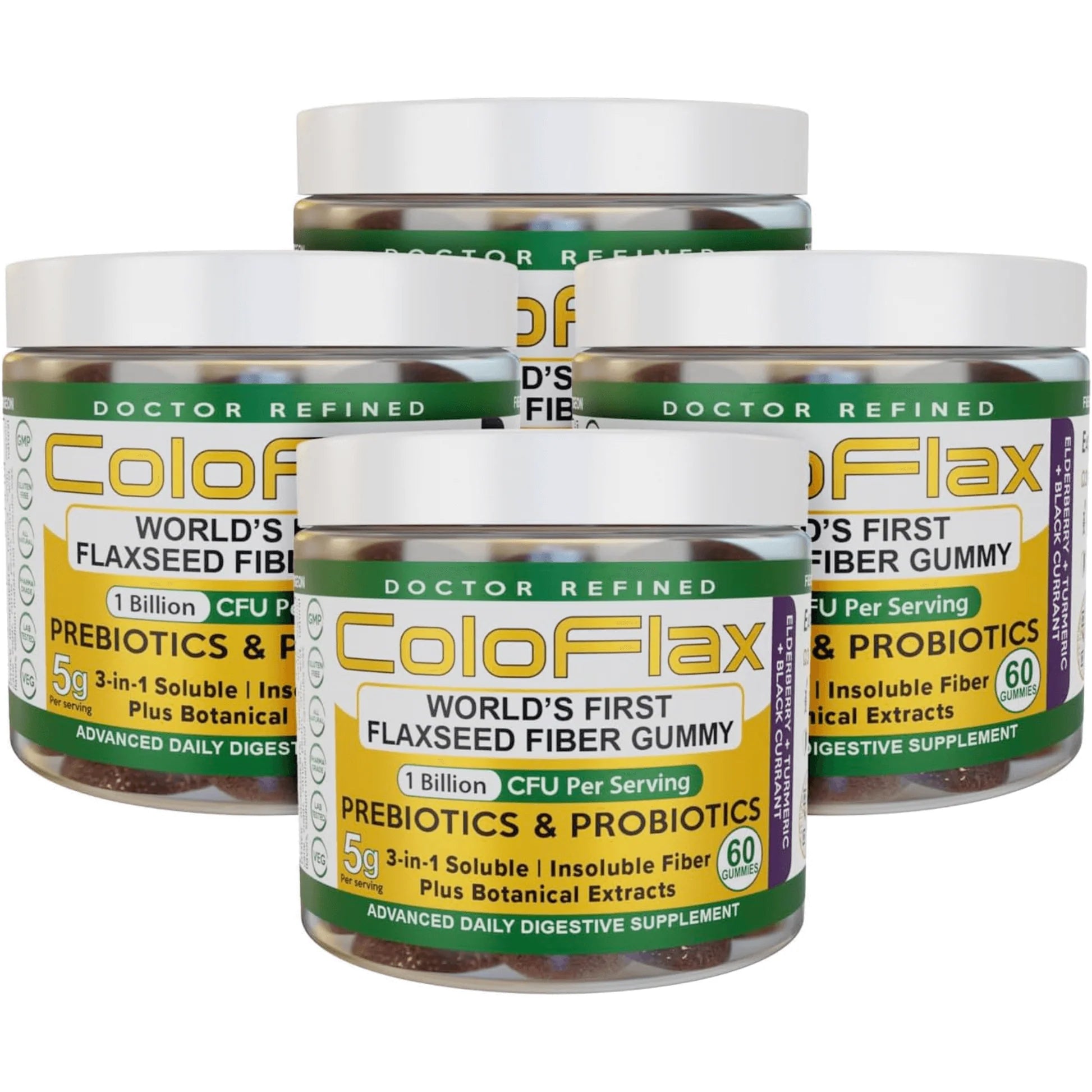Prebiotics are the fiber compounds that fuel your gut flora. Your body can’t digest them, but your gut microbiome needs them. Whether you’re consuming prebiotics in supplement form (as with ColoFlax) or from a balanced diet, they can provide a number of different health benefits.
The Health Benefits of Prebiotics
Dandelion greens, chicory root, onions, oats, legumes—all of these foods and more are high in prebiotics. Adding lots of prebiotic fiber to your diet will improve the balance of bacteria in your gut and could influence everything from your mood to your cardiovascular health.
Here are some of the main benefits associated with prebiotics:
1. Prebiotics Could Ease Constipation
Inulin is a prebiotic fiber that has been linked to a host of digestive benefits. It’s a type of oligosaccharide known as a fructan, which are chains of sugar molecules strung together. Naturally found in chicory root and other plants, inulin passes into the bowel undigested and then begins to ferment, helping natural bacteria to grow.
Consumption of inulin has been shown to help patients suffering from constipation related to irritable bowel syndrome.(1) It greatly reduces waste transit time, improves stool consistency, and helps to get everything moving again.
Just as importantly, it’s able to provide all of these benefits with no adverse reactions and no risk.
You don’t need to be suffering from IBS to benefit from regular doses of prebiotic fiber. If you suffer from regular bouts of constipation, prebiotics could restore some balance and make you regular again.
To maximize these benefits, make sure you drink plenty of water and get lots of exercise, as this also helps to ease the passage of stools through your colon.
2. Prebiotics Can Improve Nutrient Absorption
Prebiotics seemingly play an important role in mineral absorption, which could have a number of knock-on effects for overall health and well-being.
For instance, a diet rich in prebiotics could increase your absorption of calcium, a mineral that supports optimal bone and teeth health.(2)
Research into diet-induced gut microbiome changes found an improvement in both human and animal subjects, with the latter also noticing increases in bone density and strength, no doubt as a direct consequence of higher calcium levels.(3)
Your heart and muscles also use calcium, and it’s thought that it could help with the management of blood pressure.
3. Prebiotics Could Help with Weight Loss
Fiber makes you feel full, and when you’re full, you’re less likely to binge on fats and carbohydrates. We also tend to gravitate more toward fatty and sugary foods when we’re constipated or a little under the weather, so it’s no surprise that a diet rich in fiber—and prebiotic fiber in particular—can help with weight loss.
A meta-analysis in 2019 looked at the dietary records of 345 participants, 53.9% of which were female and all of which were on calorie-controlled diets.(4) It checked their records at a baseline and then again 6 months later, noting that those with a high fiber intake were more likely to adhere to a calorie-controlled diet.
The study concluded that “Dietary fiber intake, independently of macronutrient and caloric intake, promotes weight loss and dietary adherence in adults with overweight or obesity consuming a calorie-restricted diet.”
Other studies have drawn similar conclusions and some have noted significant reductions in belly fat.(5) If this is something that you struggle with, consider adding more fiber to your diet. It’s not a magic bullet and it won’t “melt” the fat away like some disingenuous weight loss infomercial, but if you persevere, you should be able to reap the benefits.
4. Prebiotics Could Boost Your Mood
The mind and the gut are linked. It seems like a strange comment, but when was the last time you had constipation/diarrhea and felt happy? Conversely, think about how good you feel when you finally get back to normal after being constipated.
We’re not just dealing with anecdotal evidence, either. Numerous studies have shown that a healthier gut microbiome can improve depression and anxiety scores.(6) (7)
This is true for both prebiotic and probiotic use, as well as a general increase in fiber consumption.
The mechanisms are still not entirely understood, but it’s clear that gut health influences the Central Nervous System (CNS) and impacts how we think and feel.
5. Prebiotics Can Help to Regulate Blood Sugar
According to the CDC, over 37 million Americans have diabetes, accounting for about 10% of the population. Over 90% of these people have type 2 diabetes, which can be managed with diet and lifestyle changes.(8)
How does that apply to prebiotics, you ask? Well, research suggests that a diet rich in prebiotics can help individuals to manage type 2 diabetes.
A 2019 meta-analysis looked at the effects of inulin-type fructans (ITF), a type of prebiotic, on 1346 patients over multiple trials. It noted significantly reduced concentrations of fasting blood glucose (FBG), as well as glycosylated hemoglobin (HbA1c), fasting insulin (FINS), and homeostasis model assessment-insulin resistance (HOMA-IR).(9)
In layman’s terms, this means that prebiotic supplementation could help you to manage your blood sugar levels.
Other studies have drawn similar conclusions, and the general consensus is that longer treatment periods produce the best results. In other words, while a prebiotic supplement probably won’t decrease your blood sugar levels from one day to the next, you could see some notable improvements after 6 weeks.
6. Prebiotics Could Improve Immune Function
Immunity has become a hot topic in recent years, as we all look for ways to improve our natural defenses. Prebiotics could play a big part in boosting immunity, as a healthier gut microbiome means your body is better equipped to fight the bad bacteria that cause infection.
Prebiotics also have an anti-inflammatory effect, inhibiting the inflammation that can cause disease.(10)
7. Prebiotics Can Reduce the Risk of Heart Disease
We all know that eating a healthy and balanced diet reduces the risk of developing chronic and life-threatening diseases, including cancer and heart disease. But do you know why?
There are actually many factors at play here.
Firstly, processed food is loaded with saturated fat and salt, both of which can clog and harden the arteries. It’s also high in carcinogens like polycyclic aromatic hydrocarbons. Not only can you avoid most of this bad stuff if you stick with a whole food diet, but you’ll be swapping those saturated fats for polyunsaturated fats (high in omega-3s), and getting more vitamins and minerals.
Whole foods are also packed with fiber, digestive enzymes, antioxidants, and prebiotics, all of which balance the gut bacteria and help to inhibit inflammation and destroy cancer-causing free radicals.
Of course, chronic diseases can also be caused by environmental factors (including pollution), lifestyle choices (smoking, drinking, drug use), and things that are completely out of your control (chemical exposure, genetics). But food plays a much bigger role than most of us like to admit.
After all, if we convince ourselves that getting cancer is just the luck of the draw, we don’t have to fix our diets and can leave everything to fate. In actual fact, while a diet rich in fiber, prebiotics, and whole foods won’t guarantee that you’ll live a long and healthy life, it’ll certainly increase your chances of doing so.
Do I Need Prebiotic Supplements?
If you have a balanced diet and a healthy gut, you probably don’t need prebiotic supplements. If, however, your diet is high in saturated fat, refined sugar, and fast food, and you don’t exercise very frequently, you should consider taking prebiotic fiber.
The best way to take prebiotic fiber is via natural, whole foods. So, while there’s nothing wrong with the occasional supplement (especially if that supplement is ColoFlax, which is also high in probiotics, omega-3s, and antioxidants), you should also stock up on foods like oats, konjac flour, chicory root, dandelion greens, garlic, and onions.
Are Prebiotics Safe?
Prebiotics are natural and safe. However, it’s important not to overdo it. Taking too much fiber in a very short space of time could make you bloated, gassy, and uncomfortable, especially if your usual diet is very low in fiber.
If you have any serious intestinal issues, have recently recovered from surgery, or have a serious autoimmune condition, consult a healthcare professional before using prebiotic or probiotic supplements.
Are Prebiotics and Probiotics the Same Thing?
Pre and probiotics are not the same thing, but they are equally important.
Probiotics are the bacteria that you introduce to your gut flora; prebiotics are the food on which they feed.
In a horticultural context, think of probiotics as the seeds that grow the flowers and the prebiotics as the soil and fertilizer that allow them to thrive. If you want your garden to thrive, you need a balance of both.
Are Prebiotics Laxatives?
Prebiotics are not laxatives, so they won’t have you running for the bathroom minutes after consuming them. The same is true for probiotics. You might experience a bowel movement the following morning or even a few hours afterward, but it should be natural and not forced or uncomfortable.
Prebiotics and probiotics actually have the opposite effect. A laxative stimulates the bowel and/or introduces water, thus hastening the passage of waste. Prebiotic fiber helps to form bulkier stools and slows the rate at which they pass through the colon.
This is actually why prebiotics, fiber, and probiotics are recommended for the treatment of diarrhea.
Is Honey a Prebiotic?
Honey has been recognized as a prebiotic as it contains oligosaccharides, which can promote the growth of probiotics like bifidobacterial and lactobacilli. However, it’s not quite the same as other prebiotics and needs to be treated with respect. There is very little fiber in honey and it’s also high in sugar, so it’s definitely not the best way to get your fill of prebiotics.
Are Prebiotics Better Than Probiotics?
Prebiotics are not better than probiotics, and the opposite is true, as well. As noted above, you need both of them for a healthy gut. You can’t expect to grow lush flowers without seeds, and those flowers won’t grow much if you don’t have the right soil or fertilizer.
Summary: Benefits of Prebiotics
Prebiotics are much more than just food for probiotics. They are an essential component of a healthy gut, and if you add prebiotic fiber to your diet you may notice some huge improvements.
Of course, everyone reacts differently, and how prebiotics benefit you will depend on your physiology, current gut health, existing medical conditions, and the types of food you’re eating. But if you’re not taking any prebiotic supplements, don’t consume a lot of fiber, and have a few digestive issues, prebiotics could make a massive difference.
References
- https://www.ncbi.nlm.nih.gov/pmc/articles/PMC7579772/
- https://pubmed.ncbi.nlm.nih.gov/26419466/
- https://pubmed.ncbi.nlm.nih.gov/25616772/
- https://pubmed.ncbi.nlm.nih.gov/31174214/
- https://www.ncbi.nlm.nih.gov/pmc/articles/PMC3856431/
- https://pubmed.ncbi.nlm.nih.gov/27647198/
- https://pubmed.ncbi.nlm.nih.gov/31914909/
- https://www.cdc.gov/diabetes/basics/type2.html
- https://www.ncbi.nlm.nih.gov/pmc/articles/PMC6896694/
- https://pubmed.ncbi.nlm.nih.gov/33086688/






